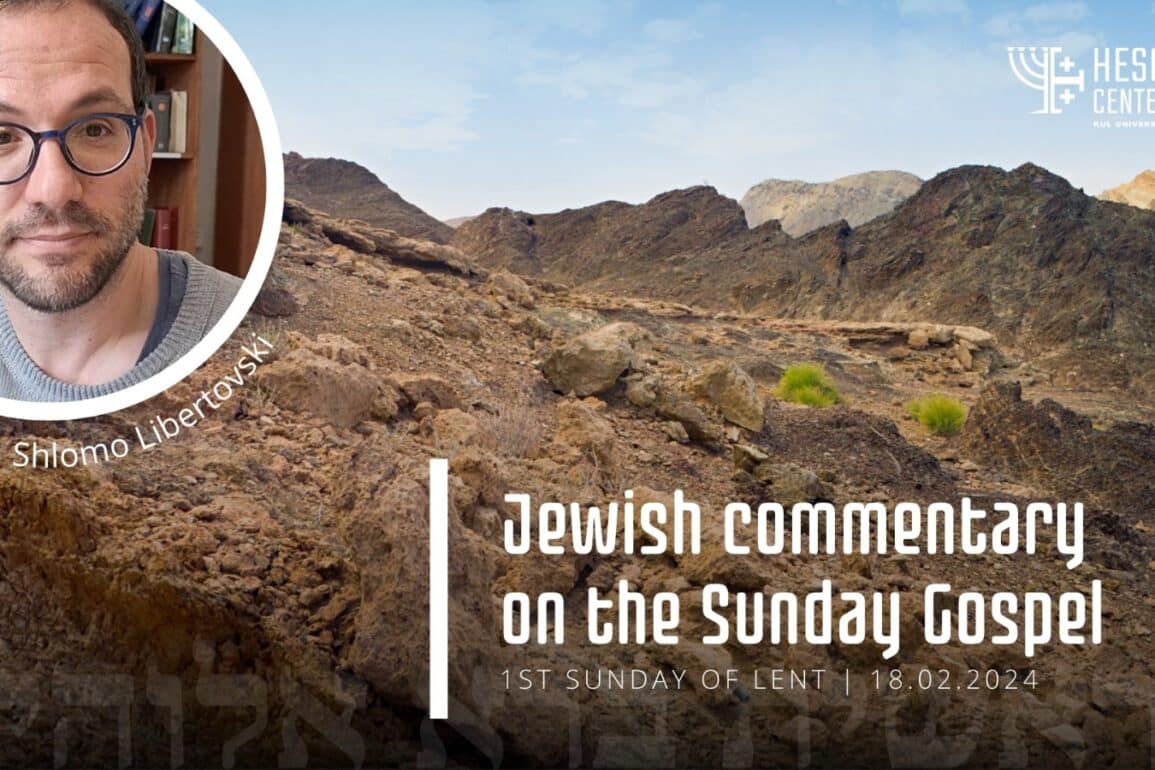In Judaism, fasting is a desire to purify and get closer to God. Its purpose is conversion. Fasting itself is useless if it does not lead to abandoning one’s evil deeds,” stressed Shlomo Libertovski in a commentary for the Heschel Center KUL on the Gospel of the First Sunday of Lent, explaining how fasting was and is viewed in Judaism today.
Fasting in Judaism
In the Gospel according to Mark it is written that Jesus spent forty days in the desert and we know from the other Gospels that he also fasted there. A forty-day fast is customary in the Church in the period of forty days (Lent) before Easter.
In Judaism, ta’anit is a day of fasting bearing religious significance. There are six fixed fast days during the year: Yom Kippur, which is an obligation coming from the Torah – its purpose is repentance and atonement for sins. There is nine of Av, seventeen of Tammuz, the fast of Gedaliah, ten of Tevet which are the fasts of mourning for unfortunate events that happened on these dates. There is also the fast of Queen Esther which commemorates the fast undertaken by the Jews of Shushan following the decrees of Haman. Esther said to David Mordechai: “Go, gather together all the Jews who are in Shushan, and fast for me. Do not eat or drink for three days, night or day. I and my attendants will fast as you do. (Est 4:16).” On the day of judgment and atonement (Yom Kippur), the purpose of the fast is not mourning, but עינוי הגוף (eenui hagoof) the submission of the body literally in Hebrew “the torture of the body” for the purpose of transcendence and purification of the soul.
The four following fasts are mentioned in the Bible in the book of Zechariah: “Thus said the Lord of hosts: the fast of the fourth and the fast of the fifth and the fast of the seventh and the tenth fast shall be for the house of Judah for laughter and joy and for good times and truth and peace love. (Zech 8:19)”. Fasting in the fourth month in commemoration of the capture of Jerusalem and the tenth month commemorates the siege of Jerusalem. However, when we remember the rebuilding of the Temple, we should not fast, but rejoice.
Other fasts
Additionally, the Halacha (Jewish Law) deals with other fasts: in ways that individuals or communities decide to fast or in different ways that one should fast at the occasion of various events.
Public fasting
A community can decide to take upon itself a fast on a certain day, usually due to some difficult situation or a decree. In the Bible we see the prophet Jonah calling the sinful inhabitants of Nineveh: “Do not let people or animals, herds or flocks, taste anything; do not let them eat or drink. But let people and animals be covered with sackcloth. Let everyone call urgently on God. Let them give up their evil ways and their violence. (Jonah 3, 7-8)”.
It is customary to have a public fast on the eve of Rosh Chodesh (New Month) or on Mondays and Thursdays when there is an interest in fasting. According to the Halacha, one must fast after a Torah scroll accidentally falls to the ground.
Over the generations and during the years of exile, the spiritual leaders commemorated the destruction and actions undertaken against the Jews by fasting and saying prayers of forgiveness and mourning. The events of Shoah (the Holocaust) and the destruction of the European Jewry have not yet been expressed in the Jewish world through fasting. Maybe this will happen in the future, as it happened with the fast of Tisha B’av, which was started decades after the destruction of the Temple.
Personal Fasting
According to the Halacha, a person can undertake fasting if he or she feels the need to do so. This person must accept the fast according to a special formula said during the Mincha (afternoon) prayer on the day before the beginning of the fast. It is also possible to fast for shorter periods of time, for example until midnight or until the time of Mincha. Those times are called “fasting hours”. The laws related to fasts are detailed in the Mishnah and the Talmud, mainly in Tractate Tanit, as well as Tractate Yoma, which deals with Yom Kippur.
The purpose of fasting
Similarly to other religions, Judaism has special dates set for spiritual ascension through fasting like Yom Kippur. On that day the goal is to grow in closeness to God and to abstain from all the pleasures of the body: eating and drinking, marital relations, etc.
In Judaism there also are many other fasts whose main purpose is different than that of the other religions – like remembrance. We fast to remember a tragic event that happened to our nation: the destruction of the Temple on Tisha B’Av, the beginning of the siege of Jerusalem on Tisha B’Av, the breaching of the walls of Jerusalem on the 17th of Tammuz and more.
Is there a connection between fasting and memory? Does fasting help us remember better? To put it simply: yes. When a person is hungry, they remember the reason for being prevented from eating and then they remember the national tragedy such as the destruction of the Temple.
When you think about it in depth, even those remembrance fasts – are actually a means of getting closer to the Holy One, blessed be He. We say in prayer that “because of our sins we have been exiled from our land.” This means that the destruction of the Temple and the exile are the result of our bad deeds. So, fasting is actually a desire to be purified, to make amends, and to draw closer to God so that He may forgive us for our sins, and that is why we ask: “Rebuild your house just as it was in the beginning”.
In the prophecies of Isaiah, Joel, and Amos, there is a criticism of fasting that is performed ritually just like a lip service and without an honest inner inclination towards God. “Is such the fast I desire, a day for men to starve their bodies? Is it bowing the head like a bulrush and lying in sackcloth and ashes? Do you call that a fast, a day when Adonai is favorable? No, this is the fast I desire: To unlock the fetters of wickedness, and untie the cords of the yoke to let the oppressed go free; to break off every yoke.” – Isiah 58, 5-6
Maimonides and other sages reiterated that the purpose of fasting is repentance, and that fasting itself is useless unless the person abandons their bad deeds.
About the author:
Shlomo Libertovski, a Torah lecturer at Beth Shemesh and a member of Nostra Aetate 4 in Jerusalem, an ecumenical organization dedicated to Jewish-Catholic dialogue.










